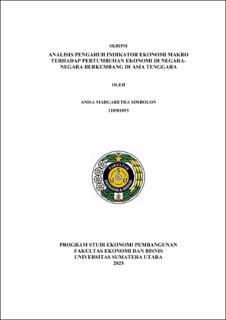Analisis Pengaruh Indikator Ekonomi Makro Terhadap Pertumbuhan Ekonomi di Negara-Negara Berkembang di Asia Tenggara
Analysis of The Influence of Macroeconomic Indicators on Economic Growth in Developing Countries in Southeast Asia

Date
2025Author
Simbolon, Anisa Margaretha
Advisor(s)
Nasution, Syahrir Hakim
Metadata
Show full item recordAbstract
Analysis of The Influence of Macroeconomic Indicators on Economic Growth in Developing Countries in Southeast Asia
Economic growth is a continuous process of increasing a country's
economic activity, which ultimately leads to an increase in national income.
Economic growth is one of the main indicators used to assess a country’s level of
development. This study aims to analyze the effect of inflation, exchange rates, and
foreign direct investment (FDI) on economic growth in developing countries in the
Southeast Asian region. The research covers eight countries: Indonesia, Malaysia,
Thailand, the Philippines, Vietnam, Laos, Cambodia, and Myanmar, with an
observation period from 2014 to 2023.
The data used are secondary data obtained from the World Bank and
analyzed using panel data regression with the Fixed Effect Model (FEM) approach,
selected based on the results of the Hausman test.
The results of the study show that, partially, inflation has a negative and
significant effect on economic growth. Conversely, the exchange rate and foreign
direct investment (FDI) have a positive and significant effect on economic growth.
Simultaneously, the three independent variables significantly affect economic
growth in developing Southeast Asian countries during the 2014–2023 period.
These findings highlight the importance of price stability, adaptive exchange rate
management, and the creation of a conducive investment climate in promoting
sustainable economic growth in the Southeast Asian region.
Collections
- Undergraduate Theses [2768]
